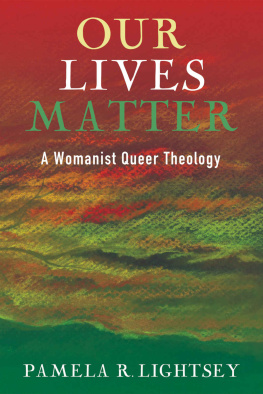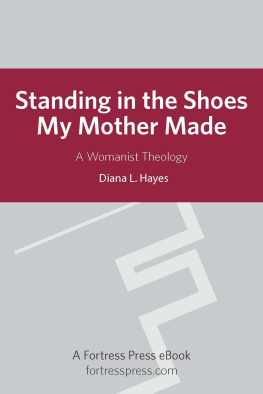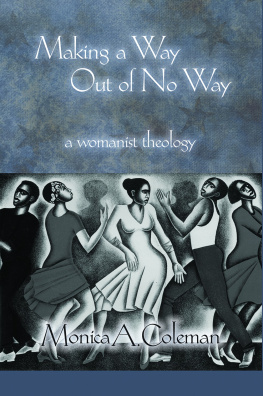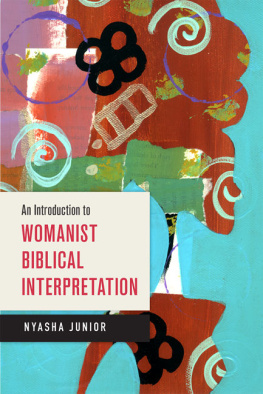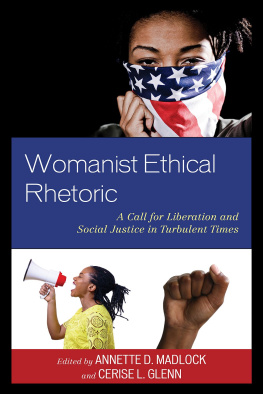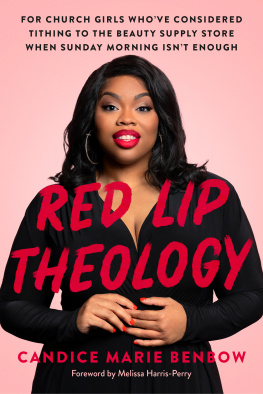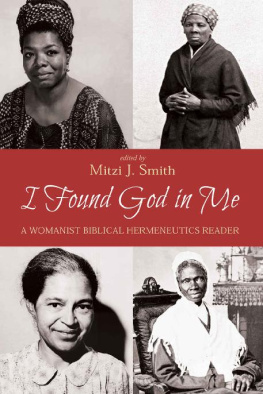Copyright 2015 Pamela R. Lightsey. All rights reserved. Except for brief quotations in critical publications or reviews, no part of this book may be reproduced in any manner without prior written permission from the publisher. Write: Permissions, Wipf and Stock Publishers, W. th Ave., Suite , Eugene, OR 97401 .
W. th Ave., Suite
Lightsey, Pamela R.
Our lives matter : a womanist queer theology / Pamela R. Lightsey
xxiv + p. ; cm. Includes bibliographical references.
Black theology. SexReligious aspects. Queer theory. I. Title.
Manufactured in the U.S.A.
To Those Whove Gone Before: Lillie Mae Holmes Lightsey, Eddie Lee Lightsey, Darrell Darnell Lightsey, Sheila Lightsey and Torry K Lightsey Ross.
Every keystroke was made possible by your imperfect but unconditional love.
Preface
I am a Black queer lesbian womanist scholar and Christian minister. To say that I am queer is not only my self-identity; it is also my active engagement against heteronormativity. Indeed, queer ideology supports my long-held suspicion that sexual identity may not be as fixed as my generation was taught by society and the Church.
I want to be clear: I am not a disinterested observer writing for the sake of supporting some lesbian, gay, bi-sexual, transgendered, or queer (LGBTQ) friend, nor is this project motivated in light of the HIV/AIDS pandemic or any desire on my part to argue against the continued stereotypes that it is a gay disease. Though both are worthy points of entrance, they are not the focus of my writing. Rather, this project is fueled by my personal passion for a subject with which I have an intimate connection: the plight of persons whose sexual orientation or whose behavior and appearance do not conform to traditional gender norms. In light of their plight, my plight, I have no right to give a passive, disinterested, voiceless treatise.
This is gut-wrenching, scandalous, debatable, yet also academic and practical work. Many who are familiar with my work will now likely question the very adjectives they once used to describe my work: anointed preacher, brilliant scholar, effective pastor, Christian disciple, compassionate counselor, fruitful evangelist. They will likely not easily grasp the possibility that God has been present and working through the life of a queer woman. Many will likely disavow every good work I have done, unable to reconcile my life and this writing with that of a real Christian believer.
Some might say this book is a courageous undertaking. I do not. In fact, my earlier years of silence had been nothing less than cowardly. No matter how strongly I advocatedas pastor and as scholaragainst homophobia and discrimination of the LGBTQ community, as a person I chose to remain distant. I rationalized my silence: now is not the right time ; youre a single mother who needs to feed her babies ; dont shame your family, your friends, your church...and on and on and on. I often told my LGBTQ peers, The historic Church can be an evil place. Be careful. And I was careful. So very careful. Careful and miserable.
When I came out, I did so with both fear and a righteous passion for the liberation of others. As one who is not far removed from the conservative evangelical tradition, I know from first-hand experience what it is like to be ostracized because you disagree with denominational polity and how it feels to be labeled as the the Other.
During my twenties, I was silenced by my pastor because I asked too many questions about the churchs laws including those against women wearing pants and jewelry. This line of questioning was determined to be my stubborn resistance to the rules of our Pentecostal church and highly disrespectful to our female pastor. Being silenced meant I could not sing in the choir, teach, comment or ask questions during Sunday School, and I was denied the opportunity to stand and give my testimony during the highly regarded element of worship called testimony service. What I had to say did not matter during the days of my punishment. I had said enough just by asking questions.
My pastor thought she was teaching me to be an obedient member. What I actually learned was a lesson that has helped make me the scholar I am today: A question can be both powerful and dreadful. It is not the answer but the act of asking simple questions that has helped shape me into on of the leading African American queer lesbian voices of social justice activism in the United Methodist Church. My relentless questioning has also led me to womanist theology.
In defining itself through the lenses of Alice Walkers womanist definition, womanist theology has provided historically marginalized Black women a platform from which to speak of both God and the Church in ways that set the church captive free. womanist theology gives Black women the theological resources to see themselves and the world in ways that do not privilege whiteness or patriarchy. Precisely because Alice Walker describes a womanist as committed to survival and wholeness of entire people, and because womanist theologians have taken this element of the definition very seriously in their writings, I was attracted to womanist theology and have found its methodology most helpful for my theological research based on queer theory.
Walkers womanist framework allowed me to redefine my perspective of theology and sexuality with an attention to the wholeness and interconnectedness of all people. It was her definition of a womanist as a woman who loves other women, sexually and/or nonsexually...sometimes loves individual men sexually and/or nonsexually and its bold acceptance by some not all Black female religious scholars, that simply blew me away! I was stunned that Black religious scholars would use this definition given what I saw as the Black communitys propensity to be extremely homophobic. Walkers definition is not merely about sexuality but also about love of the entire community, love of the folk, and it was from that point that I began to focus on sexuality not merely within the realm of sex but from a much broader perspective of sexuality and the wholeness of the person as they are connected to all of Gods creation.
Fortunately for me, I was able to study with three of the academy and Churchs finest theologians while a student at the Interdenominational Theological Center (ITC) in Atlanta: Dr. Jacquelyn Grant one of womanist theologys premier scholars, Dr. Randall Bailey, a Hebrew Bible scholar whose work challenges not only the racism of Western theology but the homophobia of the Church, and Dr. Riggins Earl, Jr., an ethicist whose work argues against normative suppositions of race and class, which are so often and easily presumed valid. Their lectures challenged me to think within as well as outside the box. I learned to think within the box to understand provincial old-school churchy arguments. I was challenged to think outside the box designed by Western theology that depicts itself as orthodox and therefore the only true way of understanding God. I was inspired to study hard, well, and long so that I might intelligently identify both the strengths and the weaknesses of Western theology and therefore competently present an argument that does not deny the sacredness of persons who do not see themselves within the constructs of heteronormativity.

